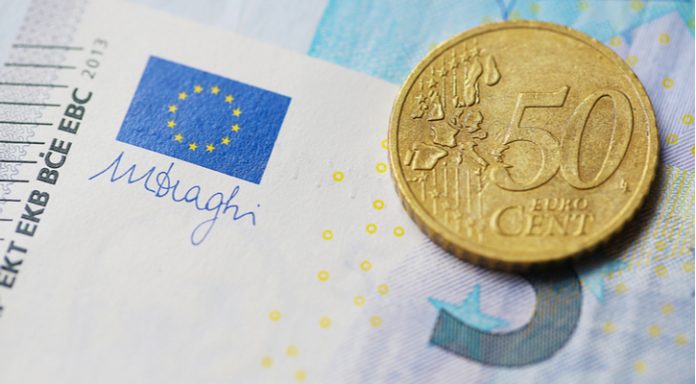The pound climbed slowly higher versus the euro on Wednesday. A mixed batch of UK data, Brexit optimism and the continued defiance of the Italian government over its spending plans meant that the pound euro exchange rate gained 0.1%. The pair continued to hover around 4-month highs, hitting a session peak of €1.1463.
| What do these figures mean? |
|---|
|
When measuring the value of a pair of currencies, one set equals 1 unit and the other shows the current equivalent. As the market moves, the amount will vary from minute to minute. For example, it could be written: 1 GBP = 1.13990 EUR Here, £1 is equivalent to approximately €1.14. This specifically measures the pound’s worth against the euro. If the euro amount increases in this pairing, it’s positive for the pound. Or, if you were looking at it the other way around: 1 EUR = 0.87271 GBP In this example, €1 is equivalent to approximately £0.87. This measures the euro’s worth versus the British pound. If the sterling number gets larger, it’s good news for the euro. |
After a very quiet UK economic calendar at the start of the week, Wednesday saw a slew of data released. The central focus was on the UK GDP release. The data showed that the summer heat wave and the World cup boosted the UK economy across the three months to August. Economic growth for this period increased 0.7%, ahead of the 0.6% that analysts had expected. This was the fastest rate of economic growth in Britain since 2016. However, monthly GDP data for August painted a different picture. Economic growth stalled in August on a monthly basis, missing analysts’ expectations of 0.1% growth.
Brexit optimism helped investors shrug off the mixed GDP data. EU Chief Negotiator Michel Barnier’s comments that a deal could be within reach next week boosted hopes of an orderly soft Brexit. The EU claimed to have found a solution to the Irish border issue, which doesn’t require a hard customs border between Ireland and Northern Ireland. There are increasing signs that the UK and the EU are resolving their difference one by one, reducing the distance between their positions.
| Why is a “soft” Brexit better for sterling than a “hard” Brexit? |
|---|
| A soft Brexit implies anything less than UK’s complete withdrawal from the EU. For example, it could mean the UK retains some form of membership to the European Union single market in exchange for some free movement of people, i.e. immigration. This is considered more positive than a “hard” Brexit, which is a full severance from the EU. The reason “soft” is considered more pound-friendly is because the economic impact would be lower. If there is less negative impact on the economy, foreign investors will continue to invest in the UK. As investment requires local currency, this increased demand for the pound then boosts its value. |
ECB Policy Meeting Account To Lift The Euro?
The Italian budget proposal has been under the spotlight for several sessions now. Euro traders continue to be disappointed by the Italian coalition government showing no signs of agreeing with the EU to reduce spending plans. With neither side looking to give ground investors fear this clash could quickly spiral out of control. Political fears have kept the euro out of favour.
Today investor’s attention will turn back to central bank policy. The European Central Bank (ECB) will release the account of their most recent policy meeting. Euro traders will be scrutinizing the minutes for any sign of support for higher interest rates in the future.
Analysts are expecting the ECB to hike around the end of the summer next year. Any hints to an earlier hike, could lift the euro.
| Why do raised interest rates boost a currency’s value? |
|---|
| Interest rates are key to understanding exchange rate movements. Those who have large sums of money to invest want the highest return on their investments. Higher interest rate environments tend to offer higher yields. So, if the interest rate or at least the interest rate expectation of a country is relatively higher compared to another, then it attracts more foreign capital investment. Large corporations and investors need local currency to invest. More local currency used then boosts the demand of that currency, pushing the value higher. |
This publication is provided for general information purposes only and is not intended to cover every aspect of the topics with which it deals. It is not intended to amount to advice on which you should rely. You must obtain professional or specialist advice before taking, or refraining from, any action on the basis of the content in this publication. The information in this publication does not constitute legal, tax or other professional advice from TransferWise Inc., Currency Live or its affiliates. Prior results do not guarantee a similar outcome. We make no representations, warranties or guarantees, whether express or implied, that the content in the publication is accurate, complete or up to date. Consult our risk warning page for more details.
This article was initially published on TransferWise.com from the same author. The content at Currency Live is the sole opinion of the authors and in no way reflects the views of TransferWise Inc.





